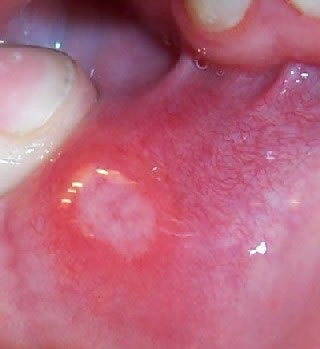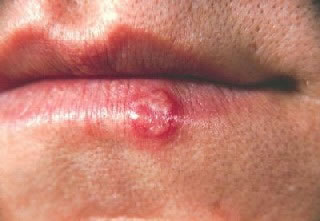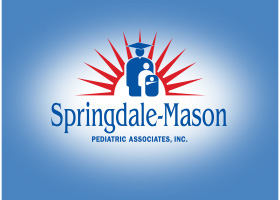What’s Going Around
Mouth Ulcers
Is this your child's symptom?
- Painful, shallow ulcers (sores) on the lining of the mouth
- Found on the gums, inner lips, inner cheeks, or tongue
- Sores only on the outer lips (such as cold sores) are not covered
Causes of Mouth Ulcers or Sores
- Canker Sores. The main cause of 1 or 2 mouth ulcers after age 5.
- Hand-Foot-Mouth Disease. The most common cause of multiple ulcers in the mouth. These ulcers are mainly on the tongue and sides of the mouth. Most children also have small deep blisters on the palms and soles. Due to the Coxsackie virus. It is common between ages 1 to 5 years.
- Herpes Simplex Virus Infection. The first infection with the herpes cold sore virus can be severe. It can cause 10 or more ulcers on the gums, tongue and lips. Key findings are additional ulcers on the outer lips or skin around the mouth. Also causes fever, pain and trouble swallowing. Usually occurs age 1 to 3. It usually follows contact with an adult who has active cold sores (fever blisters). Often they have kissed the child.
- Recurrent Cold Sores (Fever Blisters). Sores are only found outside the mouth on the outer lip. They may recur 2 or 3 times a year in the same place. There are no ulcers inside the mouth. Adult cold sores are the cause of Herpes Simplex infections in young children. Occurs in 20% of teens and adults.
- Mouth Injury. Common mouth injuries are biting the tongue or inside of the cheek. Others can be caused by a toothbrush. The lining of the mouth always looks white when it heals. So forgotten injuries can look like a canker sore.
- Mouth Burns. Hot foods (such as pizza) can cause mouth sores. They also turn white as they heal.
Causes of Canker Sores
- Canker sores have many causes.
- Minor injuries to the mouth can trigger a canker sore. Examples are from a rough food or a hard toothbrush. Biting oneself while chewing can start one.
- Food allergies or irritants may also be a trigger.
- Vitamin deficiencies can also be a cause. A vitamin deficiency can occur if your child is a picky eater.
- Canker sores can run in families (genetic).
- Often, the cause is unknown.
Symptoms of Canker Sores
- Small ulcers have a white center with a red border around them
- Size is usually less than ¼ inch (6 mm)
- Found on the inner lips and inner cheeks
- The sores are very painful, even when not eating
- Usually get 1 canker sore at a time. Sometimes get 2 or 3.
- No fever or other symptoms
When to Call Us for Mouth Ulcers
Call 911 Now
Call Doctor or Seek Care Now
| Contact Doctor Within 24 Hours
Contact Doctor During Office Hours
| Self Care at Home
|
Care Advice for Mouth Ulcers
What You Should Know About Mouth Ulcers:
- Canker sores are the most common cause of mouth ulcers.
- They are 1 - 3 painful, white ulcers of inner cheeks, inner lip or gums (no fever).
- Causes include injuries from rough food, tooth brushes, biting, or food irritants.
- Here is some care advice that should help.
Liquid Antacid for Mouth Pain (Age 1 Year and Older):
- For mouth pain, use a liquid antacid (such as Mylanta or the store brand). Give 4 times per day as needed. After meals often is a good time.
- Age 1 to 6 years. Put a few drops in the mouth. Can also put it on with a cotton swab.
- Age over 6 years. Use 1 teaspoon (5 mL) as a mouth wash. Keep it on the ulcers as long as possible. Then can spit it out or swallow it.
- Can use honey instead, until you can buy a liquid antacid. Follow the same directions as given for antacids. Avoid honey if less than 1 year old.
- Caution: do not use regular mouth washes, because they sting.
Pain Medicine:
- To help with the pain, give an acetaminophen product (such as Tylenol).
- Another choice is an ibuprofen product (such as Advil).
- Use as needed.
Fluids and Soft Diet :
- Try to get your child to drink adequate fluids.
- Goal: keep your child well hydrated.
- Cold drinks, milk shakes, popsicles, slushes, and sherbet are good choices.
- Solid Foods. Offer soft, bland foods like macaroni and cheese. Other good ones are mashed potatoes, cereals with milk and ice cream.
- Avoid foods that need much chewing. Avoid citrus, salty, or spicy foods.
- Note: fluid intake is more important than eating any solids.
- For infants, you may need to stop the bottle. Give fluids by cup, spoon or syringe instead. Reason: the nipple can increase the pain.
Return to School:
- Canker sores cannot be spread to others. Children with canker sores do not need to miss any school.
- Children with fever need to be checked before going back to school.
- Also, children with many mouth ulcers should be checked before going back.
What to Expect:
- They heal up in 1 to 2 weeks on their own.
- Once they occur, no treatment can shorten the illness.
- Treatment can help with the pain.
Call Your Doctor If:
- Mouth ulcers last more than 2 weeks
- You think your child needs to be seen
- Your child becomes worse
Remember! Contact your doctor if you or your child develop any "Contact Your Doctor" symptoms.
Disclaimer: this health information is for educational purposes only. You, the reader, assume full responsibility for how you choose to use it.

This is a picture of a canker sore on the inner lip. These sores are painful. They can be caused by many things including: injury to the tissue in the mouth, citrus fruits, acidic vegetables and allergic reactions. Some diseases can also cause a canker sore to form.

This shows a cold sore on the lip. Cold sores are caused by the Herpes simplex virus. This cold sore has been visible for two days.
Copyright 2000-2025 Schmitt Pediatric Guidelines LLC.


